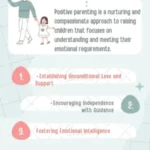In recent years, the spotlight has intensified on Positive Parenting, a methodology that prioritizes creating robust, supportive connections with children to enhance their emotional and psychological well-being. As its popularity surges, a fundamental question emerges: Is positive parenting truly effective?
Understanding Positive Parenting
Before delving into its efficacy, let’s establish a clear understanding of what positive parenting entails. Positive parenting is a method that centers on fostering a child’s emotional and psychological health within the framework of a loving and supportive parent-child relationship. It accentuates promoting good behavior through positive reinforcement, clear communication, and appropriate penalties.

Principles of Positive Parenting
Positive parenting is grounded in several fundamental principles that form its core foundation:
1. Emotional Connection
Building a robust emotional bond with your child serves as the bedrock for trust and efficient communication. This principle emphasizes the significance of emotional closeness in fostering a healthy parent-child relationship.
2. Clear Expectations
Practitioners of positive parenting provide clear and age-appropriate expectations for their children, facilitating a comprehensive understanding of limits and fostering a sense of security.
3. Positive Reinforcement
Recognizing and praising good behavior serves as a cornerstone in positive parenting. This approach encourages youngsters to repeat similar acts, contributing to the development of their self-esteem.
4. Empathy and Understanding
Understanding your child’s emotions and viewpoint is deemed vital for successful positive parenting. This principle underscores the importance of empathy in nurturing a child’s emotional well-being.
5. Effective Communication
Clear and honest communication is a pivotal aspect of positive parenting, contributing to stronger parent-child interactions and enhancing communication abilities in children.
6. Consistency
Maintaining consistency in discipline and expectations provides children with stability and predictability, fostering a sense of security crucial for their emotional development.
Is Positive Parenting Effective?
The efficacy of positive parenting has been the subject of numerous studies and research endeavors. While acknowledging that it may not be a one-size-fits-all solution, the available data robustly indicates that positive parenting can be exceptionally beneficial in various ways.
Benefits of Positive Parenting
For Children:
Positive parenting has been consistently associated with a myriad of advantages for children, including:
1. Stronger Emotional Management
Children raised in a positive parental setting tend to exhibit stronger emotional management abilities. They can comprehend and regulate their emotions more effectively, contributing to healthier emotional development.
2. Increased Self-Esteem
The emphasis on positive reinforcement and emotional support leads to increased self-esteem in youngsters. They feel cherished, confident, and capable of navigating life’s challenges.
3. Improved Conduct
Positive parenting strategies, focusing on incentives for positive behaviors rather than punishment for negative ones, contribute to the cultivation of excellent conduct in children.
4. Enhanced Communication
The deliberate focus on effective communication within the positive parenting framework results in greater parent-child interactions and enhanced communication skills in children.
For Parents:
Positive parenting isn’t just beneficial for children; it also brings advantages for parents, including:
1. Lowered Stress
By minimizing power struggles and confrontations, positive parenting effectively lowers stress levels for parents. This reduction in stress contributes to a healthier family dynamic.
2. Improved Parent-Child Relationship
The emphasis on empathy and understanding within positive parenting significantly enhances the parent-child connection, fostering more rewarding partnerships and moments of shared understanding.
3. Confidence in Parenting
Positive parenting equips parents with the confidence that they are employing constructive approaches to raise their children. This confidence is essential for navigating the complexities of parenting.
Challenges of Positive Parenting
While positive parenting boasts numerous benefits, it is not without its set of challenges. Some parents may find it difficult to:
1. Stay Consistent
Maintaining consistency in excellent parenting methods may present a challenge, requiring continuous effort and dedication.
2. Manage Negative Conduct
Dealing with negative conduct without resorting to punitive measures can test the patience and creativity of parents engaged in positive parenting.
3. Time-Consuming
Positive parenting often demands more time and effort in terms of communication and emotional support. This time investment can be challenging for parents with busy schedules.
Common Criticisms of Positive Parenting
Despite its widespread support, positive parenting has not escaped criticism. Detractors contend:
1. It’s Permissive
Critics argue that positive parenting may lead to permissiveness, with children potentially failing to grasp the consequences of their conduct.
2. Not Successful for All
Acknowledging that positive parenting may not be universally successful for all children, some critics propose the need for alternative treatments tailored to individual needs.
Alternatives to Positive Parenting
For parents who find positive parenting challenging or unsuitable for their family dynamics, alternative parenting styles exist. Notable options include authoritative parenting, combining warmth with clear expectations, and authoritarian parenting, which is more rule-based.
Conclusion
In conclusion, positive parenting emerges as a beneficial technique for many families, promoting emotional well-being and robust parent-child interactions. However, it is essential to acknowledge its challenges and critics. The choice of a parenting style should align with your family’s values and your child’s needs. Flexibility and adaptability in your approach are crucial, aiming always to provide a caring and supportive atmosphere for your child’s healthy growth.





